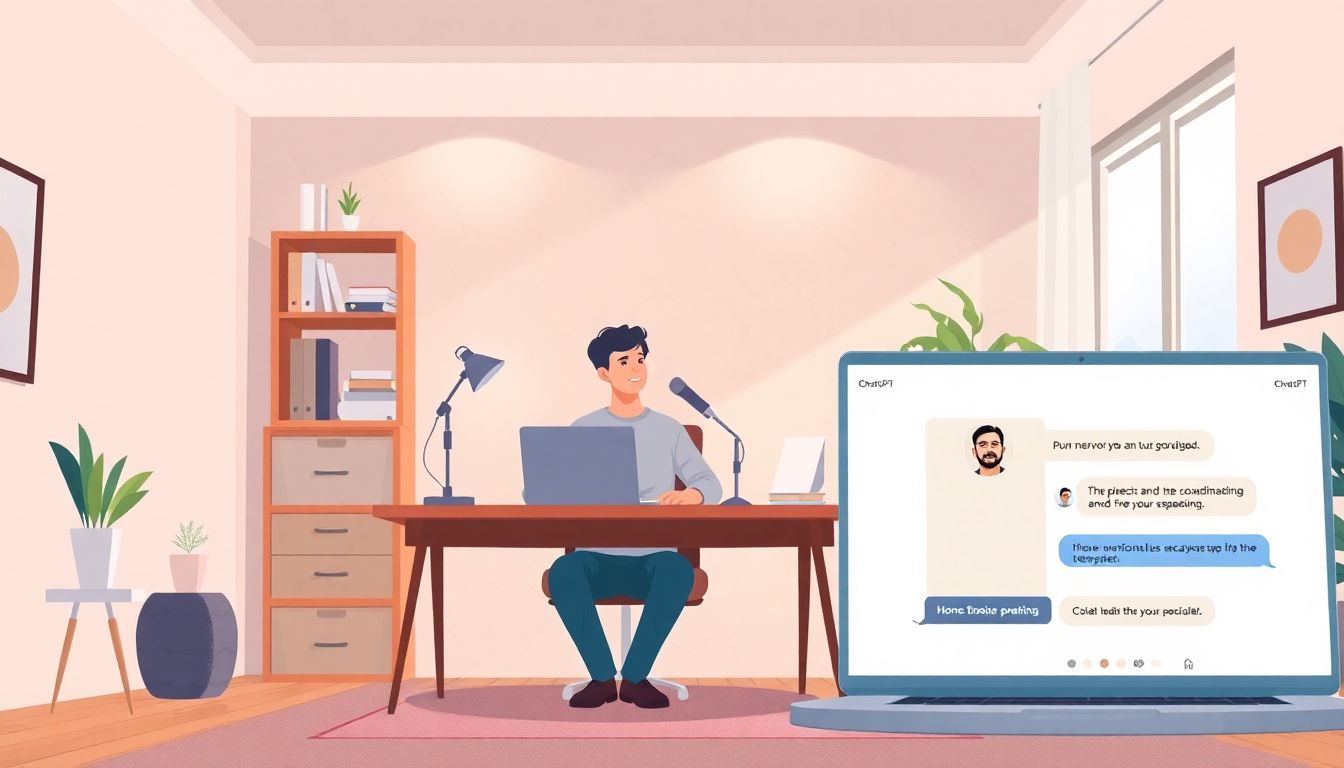Public speaking can be a real nightmare for many of us. Whether it’s the fear of stumbling over words, forgetting key points, or the dreaded silence from the audience, it’s a common hurdle that lots of people face. You’re definitely not alone if the thought of speaking in front of a crowd makes your heart race!
But what if I told you there’s a way to turn that nervous energy into confidence? By using ChatGPT for public speaking coaching, you can refine your skills and gain valuable insights—all from the comfort of your own home. Stick around, and you might just discover the helpful strategies and tools that will transform you into a speaking pro.
In this blog, we’ll explore how to leverage ChatGPT for effective public speaking practice, from creating engaging speeches to receiving constructive feedback. Let’s dive in and take your public speaking skills to the next level!
Key Takeaways
- Public speaking can be daunting, but using ChatGPT can help boost your confidence and skills.
- Identify your specific speaking goals and set ChatGPT to act as a personalized coach for targeted improvements.
- Receive real-time feedback on your speech delivery, pacing, and engagement to enhance your performance.
- Make ChatGPT a regular part of your practice by scheduling daily speech sessions and setting clear goals.
- Balance AI feedback with insights from human peers to foster personal growth and develop your unique style.
- Success stories demonstrate significant improvements in speaking abilities and audience engagement through consistent use of ChatGPT.

How to Use ChatGPT for Public Speaking Coaching
Using ChatGPT as a public speaking assistant is straightforward and effective.
Start by identifying your specific public speaking goals—whether it’s improving speech clarity, confidence, or delivery style.
Then, set up ChatGPT to simulate a coaching environment.
You can task it as your AI public speaking coach to provide tips on structuring your speech, enhancing your delivery, or even practicing against an audience by requesting speech simulations.
For example, you could say, “Act as my AI public speaking coach and help me structure a persuasive speech on climate change.”
This process enables personalized coaching and allows ChatGPT to suggest practical strategies that cater to your specific needs.
Benefits of ChatGPT in Public Speaking Practice
There are numerous benefits to incorporating ChatGPT into your public speaking practice.
First, it enhances your speech delivery by providing targeted feedback and helping you adjust your pacing and tone.
Secondly, using AI can significantly improve your confidence; practicing speeches in a non-judgmental environment encourages experimentation and reduces anxiety.
ChatGPT provides real-time feedback on your presentation skills, enabling you to make immediate adjustments without the pressure of an audience.
Its customized coaching experience tailors feedback based on your individual performance, making each interaction unique.
Lastly, the convenience of AI training makes it easier to practice regularly—no scheduling conflicts, just you and your virtual coach whenever you need it.
Getting Started: Setting Up ChatGPT for Public Speaking
To get started with ChatGPT for public speaking, first, create an account on the platform if you don’t have one.
Familiarize yourself with the features that ChatGPT offers, such as conversational prompts and response feedback.
When configuring ChatGPT for public speaking, clearly define what kind of coaching you’re looking for.
For instance, you could use prompts like, “Help me practice a 5-minute speech about personal growth” or “Provide tips on how to engage my audience effectively.”
Consider integrating ChatGPT with other learning resources for a more well-rounded experience, like videos on speech techniques or articles about overcoming stage fright.
With everything set up, you’ll be ready to dive into your public speaking journey with your AI coach by your side.
Effective Prompts for Practicing Speeches with ChatGPT
Crafting effective prompts for ChatGPT can make your practice sessions more productive.
Here’s a list of prompts you can use to get started:
- “Generate a persuasive speech outline about the importance of mental health awareness.”
- “Help me write a humorous introduction for a toast at a wedding.”
- “Analyze this famous speech and summarize its main persuasive techniques: [insert speech text].”
- “Create a list of questions an audience might ask after my presentation on renewable energy.”
- “Draft a closing statement for a debate on climate change policies.”
Using these prompts helps you engage ChatGPT effectively, leading you towards speech improvement with every session.

Using ChatGPT for Feedback on Speech Delivery
ChatGPT can offer valuable insights on your speech delivery, enhancing your performance effectively.
Start by practicing your speech aloud and then enter it into ChatGPT for assessment.
Use prompts like, “Evaluate my speech for clarity, pacing, and engagement,” to gather constructive and specific feedback.
Additionally, you can ask, “Identify areas where my tone can be more varied for emphasis.”
Request suggestions for improving your body language with commands like, “What non-verbal cues can I incorporate to better engage my audience?”
This two-way interaction provides a comprehensive review of your delivery style, helping you become a more confident speaker.
If you want to simulate a Q&A session, you can prompt, “Act as an audience and ask questions based on my speech about [topic].”
Being prepared for potential questions will make you feel more at ease during the actual presentation.
Incorporating ChatGPT into Your Public Speaking Routine
Integrating ChatGPT into your daily public speaking practice can significantly enhance your skills.
Set aside time each day to practice speeches, ensuring that ChatGPT becomes a regular tool in your routine.
For structure, you might say, “Help me create a daily speech practice schedule.”
This can keep you accountable and make your practice sessions more productive.
Consider using ChatGPT as a speech partner by simulating conversations around your speech topics.
You can prompt, “Let’s role-play an interview scenario about my presentation on [topic].”
Moreover, keeping abreast of new techniques is essential, so ask, “What are the latest strategies for effective public speaking I should know?”
Creating a checklist of what to focus on during your sessions can also be beneficial.
A prompt like, “Outline key areas to focus on for a compelling speech,” can help guide your practice sessions.
Common Challenges and Solutions with ChatGPT in Public Speaking
While using ChatGPT can greatly aid your public speaking journey, there are challenges to consider.
One common issue is relying too heavily on AI feedback, which can limit personal growth.
To counter this, balance AI input with feedback from human peers or mentors.
Invite a friend to listen to your speech and provide insights alongside ChatGPT’s evaluation.
Another challenge may be technical glitches or misunderstandings of prompts.
To mitigate this, be specific and concise in your requests, like, “Identify the key points in my speech on sustainable living.”
If you feel demotivated, remind yourself of your goals and accomplishments.
Using prompts like, “Reflect on what I’ve learned through ChatGPT in public speaking,” can foster motivation and keep you focused.
Lastly, remember that while AI is a powerful tool, it’s essential to develop your unique voice and style as a speaker.
Success Stories: Individuals Who Improved Their Public Speaking with ChatGPT
Numerous individuals have witnessed substantial improvements in their public speaking abilities through ChatGPT.
For example, a recent user shared how they transformed a lack of confidence into poise by incorporating daily practices with ChatGPT.
They stated, “Using specific prompts helped me pinpoint my weaknesses and work on them effectively.”
Another user reported a measurable increase in audience engagement, citing ChatGPT’s advice on body language and audience interaction techniques.
One review highlighted that after three months of utilizing ChatGPT, they received more positive feedback on their presentations, with colleagues noting their improved clarity.
Real-life case studies show an uptick in successful sales pitches and presentations as individuals found their unique speaking styles with the help of tentative AI coaching.
Communities are forming around this practice, encouraging discussions and sharing success stories.
Consider gathering quantitative results, like reduced anxiety levels or increased audience retention for future presentations, to track your own progress.

Conclusion: The Future of Public Speaking Coaching with AI
The future of public speaking coaching with AI, particularly ChatGPT, looks promising.
Advancements in AI technology continue to improve the way we learn and practice public speaking skills.
Imagine having an AI coach with access to endless resources, insights, and personalized feedback—all at your fingertips.
This convenience allows speakers to refine their skills anytime and anywhere, creating opportunities for growth that were previously unimaginable.
Moreover, emerging trends in public speaking education suggest a growing integration of AI into traditional coaching methods.
While human coaches offer emotional intelligence and personalized mentoring, AI can enhance these sessions with data-driven insights.
It provides a complementary approach that leverages both human and machine strengths.
As AI tools like ChatGPT evolve, it’s essential to consider ethical implications in coaching—ensuring that the advice isn’t just effective, but also responsible.
Looking ahead, hybrid models of coaching that combine AI with human expertise may become the norm.
With continuous developments in communication skills facilitated by AI, aspiring speakers can look forward to a more tailored and efficient learning experience.
Ultimately, utilizing ChatGPT as a public speaking coach might not just prepare you for your next speech, but empower you to become an impactful communicator in diverse settings.
FAQs
ChatGPT can provide personalized tips, simulate audience questions, and help draft and refine speeches. It can also offer feedback on delivery strategies, helping you build confidence and improve your overall public speaking abilities.
Effective prompts include asking ChatGPT to simulate a specific audience, request tailored feedback on content and structure, or challenge you with difficult questions. This variety enhances engagement and improves your speaking adaptability.
Challenges include potential limitations in understanding context, generating persuasive content, or providing in-depth feedback. Overcoming these often requires iterating prompts and clarifying objectives to get more relevant responses.
Yes, integrating ChatGPT can enhance your practice routine. Use it for regular speech drills, feedback sessions, and to brainstorm new topics. This consistent interaction keeps your skills sharp and helps maintain motivation.
